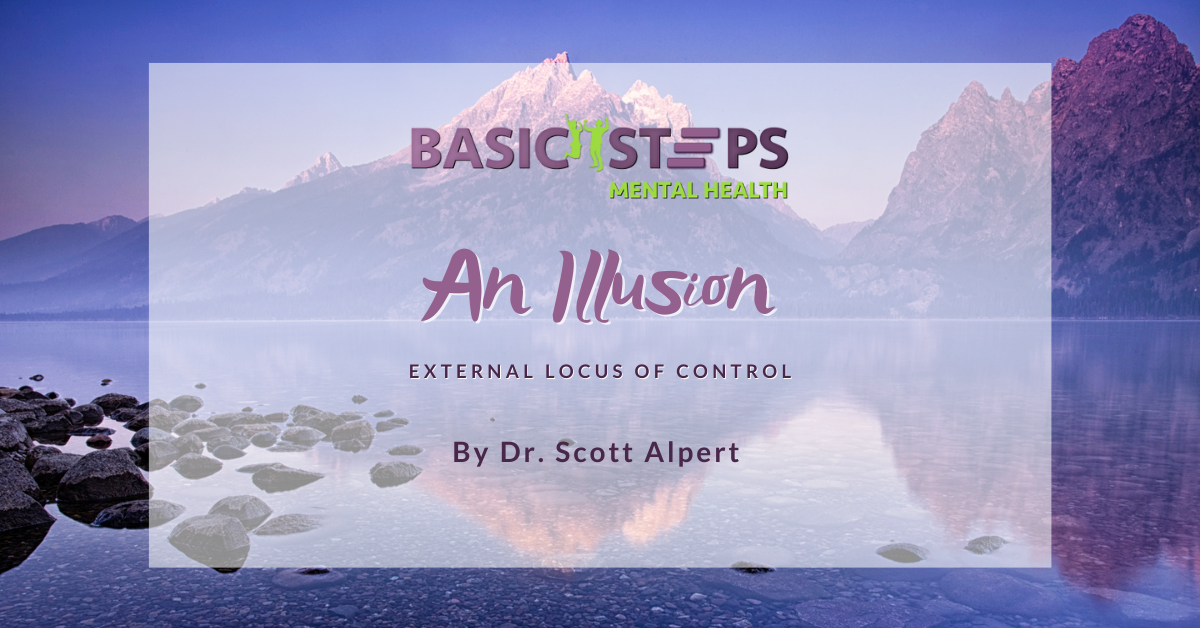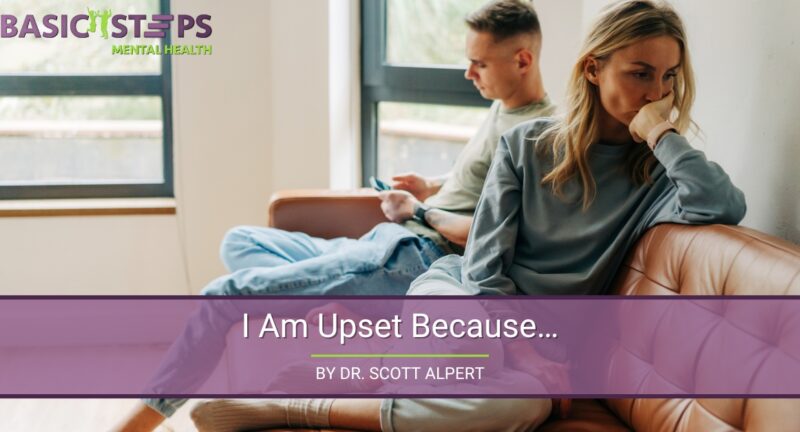
An Illusion – External Locus of Control
Locus of control is a fancy term for who we believe is in control of us. If you are the type of person who focuses all of your attention on what other people are doing now, what they have done in the past, and what you think that they will do, you have an “External Locus of Control”. In our practice, probably 90% of those we treat are focused on the external or what we also refer to as – “The Illusion”.
Do you really know, without a shadow of a doubt what other people are thinking? Without one doubt? To be honest, it is impossible to know with 100% accuracy what they are thinking because you aren’t them. The only person you really know what is on their mind is you.
Everything outside of ourselves is just an illusion. When something exterior happens it goes through our filter where we make it good or bad. Then we have a decision to make, what should we do about it? Here is where life gets a little dicey. If we are going off of our assumptions (and you know what assume really means) we are in problematic territory. This is where relationship problems stem from. We usually believe our assumptions are valid and… well, what do you do? Usually, people get angry, say something they later regret or have to defend what they did for months on end. Yikes!
Sigmund Freud believed that our sense of self is very fragile and was easily threatened by others. To defend ourselves, we would “Project” our faults onto another person in order to feel more superior. This projection process is like a film projector in which we are the projector and others are the screen. In all actuality, everything we see in others is really what we see in ourselves.
Projections are both good and bad. When you see somebody that opens your heart, they remind you of the goodness inside of you. If you become angry with another person, you are really angry with you. Projection work is very powerful because when we are able to “Own” our projections, meaning – when we are able to realize that the judgment we have towards another person is really a judgment you have towards yourself, you have the opportunity to process through your shame and change for the better.
For so long I would harshly judge people who I believed were angry. That was because I wasn’t at peace with my own anger. If you get an angry feeling in your gut when you view somebody, ask yourself, how do they remind you of you.
Everything outside of ourselves is just an illusion. This was the slogan I learned in graduate school. Reality is what is really going on in our head and we can train ourselves to seeing “The loving essence of another person” instead of their faults.
Why do we focus on faults? Have you ever pondered that? If you were to take a 10 item test and miss two answers what would you be focused on? Yep, those two darn questions that were worded wrong or some other excuse. Am I right? Children generally hear 500 no’s to one yes. “Don’t do that.” “No, no, no.” So we have been trained to even look for the negatives. And of course, our focus is on the worst thing that can happen. You’ve heard the slogan: Prepare for the worst and hope for the best. All this negative attention makes us sick, weak, and unpleasant to be around.
I choose to focus on the positive. It is a process of leaning into the best scenario. It’s like arriving at a door of opportunity. I’ve learned to lean in to see if the door will open. It is actually a process of Assuming the best. (Oh, there is that darn word again). But, it is a process of anticipating success.
The interesting thing is we do this “leaning in” process every single day. I lean into my car starting, my arriving safely to my destination, my job still being there, etc., etc. But when it comes to people or opportunities, it becomes a whole different ballgame. Possibly through the process of learned helplessness, where we condition ourselves to fail because we have failed so many times before.
Let’s face it, we cannot control other people. That isn’t our job anyway. If we work hard to control them and make them into how we want, we really don’t love them. They become an object to manipulate or tolerate. It is a full-time job to control ourselves anyway. Therefore it follows that it is a full-time job for them to control them. All we can do is model what we want them to do and let go of our attachment to how they are living their life. People are on their own path and are living their life to the best of their ability. Who are we to judge their growth process? I am sure you have done enough judging of yourself anyway. If you don’t believe that, consider all the projections you have done to others. Allow people the dignity of living their own life. And, praise yourself for getting this far in your own life. Nobody guaranteed that life would be easy for you and if you choose to be harsh towards others or yourself that is up to you. Hopefully, you are finding some enjoyment in that.
Woundology is the term by Carolyn Myss about how people bond in their woundedness. How often do you start off a conversation complaining about something. Then the game is on and basically people can one-up one another for hours. I just tell people “You are right, that is the worst thing I’ve ever heard”. I’d rather focus on the goodness of my day.
We used to have a cuss jar at my job at the Mental Health Urgent Care Center. The staff always complained about the clients so we fined people a quarter for each negative comment. Trust me, a negative workplace makes a job torturous. I have to admit, I would drop quarters into that pot when I just needed to vent. But, eventually we would buy pizzas and have a party with the proceeds. You know turning lemons into lemonade.
Bottom line, allow people to be themselves and simply love them. They are doing the best they can. If you think people are judging you, know that you are really judging yourself, and lean into the good and share love. Wouldn’t this world be a better place if we all did this? Since we can’t make people do this very thing, do it yourself and become a model for others to follow.
Compassionate Care is Always Available
There are many more tools and strategies you can use in your pursuit of happiness. Here is where we come in. Contact us at Basic Steps Mental Health and let us support and educate you on this journey back to your loving heart center. Imagine living a heart-centered life, regardless of what is happening externally. We’d love to be of help.
For 25 years, Dr. Scott Alpert, the clinical director of Basic Steps Mental Health, has treated over 7,000 people with mental health and addiction problems, using a Psychological approach that mixes and matches ten of the top approaches used in the industry. We are here virtually and in-person to help you get through this COVID-19 pandemic and many other difficulties you may be experiencing.
May you have good mental health.
Related Posts
Conscious Living
What’s familiar is familiar, no matter what it is. Bad relationships,...
I Am Upset Because…
Have you ever considered that what you see is make-believe? That people...




